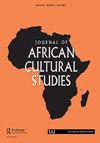嘲笑塞拉利昂的埃博拉:危机时期的幽默
IF 0.9
2区 社会学
Q2 CULTURAL STUDIES
引用次数: 1
摘要
摘要2013年至2016年的西非埃博拉疫情导致了长期的紧急状态和日常生活的巨大变化。尽管这是一个充满挑战的时期,幽默仍然是社交互动和交流的一部分。危机时期很适合幽默,因为危机和幽默都是以荒谬为基础的。本文试图在现有作品的基础上,将幽默视为一种生产形式,重点关注在塞拉利昂埃博拉疫情期间,幽默在社会和政治生活中如何以不同、同时和矛盾的方式发挥作用。本文借鉴了2014年至2020年塞拉利昂的实地调查,追溯了幽默在实践中如何与社会凝聚力联系起来,作为一种协商不确定性的方式,并分析了它在幸存者和非幸存者之间互动中发挥的象征作用。最后,它分析了自疫情结束以来,幽默是如何帮助重新构建经历的。我认为幽默扮演着多种有形的角色,可以在危机期间和之后塑造社会关系。本文章由计算机程序翻译,如有差异,请以英文原文为准。
Laughing off Ebola in Sierra Leone: Humor in Times of Crisis
ABSTRACT The West African Ebola epidemic of 2013 to 2016 resulted in a long-term state of emergency and dramatic changes to everyday life. Despite it being a challenging period, humor was still part of social interactions and exchanges. Periods of crisis can lend themselves well to humor due to the fact that both crisis and humor find their foundations in absurdity. This article seeks to build on existing work by looking at humor as a form of production, focusing on how it functioned in different, simultaneous and contradictory terms in social and political life during the Ebola epidemic in Sierra Leone. Drawing on fieldwork from Sierra Leone between 2014 and 2020, this article traces how humor worked in practice in relation to social cohesion, as a way of negotiating uncertainty, and analyses the symbolic role it played in interactions between survivors and non-survivors. Finally, it analyses how humor has helped re-frame experiences since the epidemic ended. I argue that humor plays multiple and tangible roles, and can shape social relations during and after times of crisis.
求助全文
通过发布文献求助,成功后即可免费获取论文全文。
去求助
来源期刊

Journal of African Cultural Studies
Multiple-
CiteScore
1.70
自引率
10.00%
发文量
13
期刊介绍:
The Journal of African Cultural Studies publishes leading scholarship on African culture from inside and outside Africa, with a special commitment to Africa-based authors and to African languages. Our editorial policy encourages an interdisciplinary approach, involving humanities, including environmental humanities. The journal focuses on dimensions of African culture, performance arts, visual arts, music, cinema, the role of the media, the relationship between culture and power, as well as issues within such fields as popular culture in Africa, sociolinguistic topics of cultural interest, and culture and gender. We welcome in particular articles that show evidence of understanding life on the ground, and that demonstrate local knowledge and linguistic competence. We do not publish articles that offer mostly textual analyses of cultural products like novels and films, nor articles that are mostly historical or those based primarily on secondary (such as digital and library) sources. The journal has evolved from the journal African Languages and Cultures, founded in 1988 in the Department of the Languages and Cultures of Africa at the School of Oriental and African Studies, London. From 2019, it is published in association with the International African Institute, London. Journal of African Cultural Studies publishes original research articles. The journal also publishes an occasional Contemporary Conversations section, in which authors respond to current issues. The section has included reviews, interviews and invited response or position papers. We welcome proposals for future Contemporary Conversations themes.
 求助内容:
求助内容: 应助结果提醒方式:
应助结果提醒方式:


